You are using an out of date browser. It may not display this or other websites correctly.
You should upgrade or use an alternative browser.
You should upgrade or use an alternative browser.
Russia's Invasion of Ukraine (Official Thread)
- Thread starter newarkhiphop
- Start date
More options
Who Replied?This is wild.
88m3
Fast Money & Foreign Objects
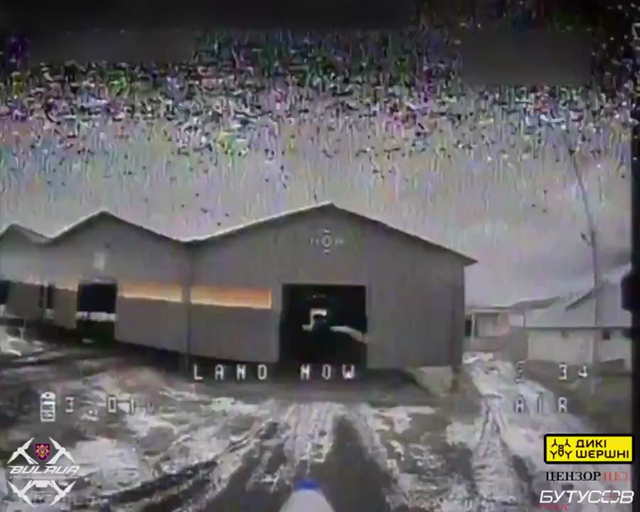
NOELREPORTS 🇪🇺 🇺🇦 (@noelreports@mstdn.social)
Attached: 1 video 🔥Ukrainian units of the Bulava strike unit of the Bohdan Khmelnytskyi Separate Presidential Brigade managed to find and fly FPV drones into a Russian warehouse. Among Russian losses are a BMPT Terminator, two S-60 anti-aircraft guns, two T-72 tanks, a BMP-3 and two URAL trucks...
lmao
88m3
Fast Money & Foreign Objects
This is wild.
was just watching this and shared a link didn't realize you dropped the youtube





ISS: Russian special services behind attack on Estonian minister's car
The Internal Security Service (ISS) said it has identified the people who vandalized cars belonging to the interior minister and a journalist last year. A total of 10 people were detained as part of the criminal investigation. ISS believes they acted on behalf of the Russian special services.
ISS: Russian special services behind attack on Estonian minister's car
ERRUpdated: today at 09.19
Police investigate Lauri Läänemet's car after its windows were smashed.
Police investigate Lauri Läänemet's car after its windows were smashed. Source: SCANPIX/Postimees/Erik Prozes
The Internal Security Service (ISS) said it has identified the people who vandalized cars belonging to the interior minister and a journalist last year. A total of 10 people were detained as part of the criminal investigation. ISS believes they acted on behalf of the Russian special services.
The ISS said on Tuesday the purpose of the hybrid operation was to sow fear and create tension in Estonian society. Six of the detainees are in custody.
The evidence suggests the suspects performed various roles following instructions from the Russian special services. For example, they gathered information needed to make attacks and then carried them out.
They were also encouraged to commit crimes, such as smashing the car windows of vehicles belonging to Minister of the Interior Lauri Läänemets (SDE) and a journalist and vandalizing memorials.
State Prosecutor Triinu Olev said this is a preliminary investigation and it will be verified via criminal proceedings. As proceedings are ongoing, it is not possible to release a lot of information.
"Proceedings have been initiated under the Penal Code, which deals with offenses against the security of the Republic of Estonia," Olev said. "We cannot overlook the gravity of the offense under investigation and the fact that, according to the suspects, they were prepared to take part in activities against the security of the Republic of Estonia without thinking about the consequences."
She said those arrested are citizens of Russia and Estonia. Additionally, some hold dual citizenship.
Prime Minister Kaja Kallas and State Prosecuter Triinu Olev. Source: Madis Hindre/ERR
Internal Security Service (ISS) Director General Margo Palloson said most of the individuals already have criminal records. Some are Russian residents who were recruited in Russia, while others were approached through social media.
"It is a broader trend today that both Russian and Chinese special services are approaching people through social media. It was also agreed there what the charges are for attacking different sites. The fee was not significant and certainly not worth the risk. It was a matter of specifically targeted orders to attack a specific object," he said.
The ISS has also managed to stop several attacks. Palloson said: "There was a plan to attack specific individuals' vehicles yet, which we foiled. This is a new method of influence. In our assessment, Russia did not achieve its objective."
The director general had one message for people who carry out activities against Estonia: "Sooner or later we will catch those who try to threaten Estonia's national security."
He said Russian special services have been trying to create tension in Estonia in many ways for years.
There is no wide support for these types of divisive activities in Estonian society, and Russia is not achieving its goals, Palloson said. Those who carry them out will gain little from it.
Margo Pallosson. Source: Priit Mürk/ERR
"The Russian service does not care about the fate of the perpetrators, they are used as a tool and the consequences are left to their own devices," he added.
The suspects were arrested in Estonia between December and February. The most recent arrests were carried out last week.
Läänemets told ERR that the threat assessment shows Russia has been carrying out activities to create fear and raise tensions for several years.
"This is part of Russia's hybrid attacks, which are not dissimilar to the bomb threats emailed to schools and cyber attacks. We as a society should be aware that its main aim is to divide and weaken the unity of society. And if we know this, we can take the news and these actions more pragmatically," the minister said.
Director General of the Foreign Intelligence Service Kaupo Rosin told MPs on Tuesday in the Riigikogu's Constitutional Committee that similar attacks may take place elsewhere.
"The public does not talk about what is happening in other countries. I would say with high confidence that such action has not only been against Estonia but has also been against other countries. Here we are no different," Rosin said.
Lauri Läänemets (SDE). Source: Siim Lõvi /ERR
Läänemet's car was broken into in early December. At the time, advisor to the minister Vootele Päii told ERR the vehicle was Läänemet's personal car, also used by his partner, and most of its windows had been smashed. Other vehicles parked nearby were untouched.
The Police and Boarder Guard Board (PPA) and domestic security falls under the minister's authority.
A vehicle belonging to Andrei Šumakov, editor-in-chief of the news portal Delfi's Russian-language website, was also vandalized on the same day.
On Tuesday, the Ministry of Foreign Affairs of Estonia said it will summon Russia's top diplomat in Estonia.
Earlier today, Latvia's State Security Service (VDD) said it detained a person suspected of desecrating a memorial site in Latvia on behalf of the Russian special services, as well as attempted provocations at memorial sites in the other Baltic states.
Prime minister: Reveal their methods
Commenting on the investigation, Prime Minister Kaja Kallas (Reform) called on other countries to speak up when they are attacked by Russia.
"Estonia has successfully stopped a hybrid operation by Russia's security services on our territory," she wrote on social media on Tuesday afternoon.
"We know the Kremlin is targeting all of our democratic societies. Our answer: be open and reveal their methods. This is the way to deter harmful actions and make us resilient."
This article was updated to add comments from Lauri Läänemets and Kaupo Rosin. Then again to add comments from Margo Palloson, Triinu Olev, Kaja Kallas and information from the Ministry of Foreign Affairs.
--
@88m3 @ADevilYouKhow @wire28 @dtownreppin214 @Leasy @Neo The Resurrected ONE @MAKAVELI25
@wire28 @BigMoneyGrip @Dameon Farrow @re'up @Blackfyre @NY's #1 Draft Pick @Skyfall @2Quik4UHoes

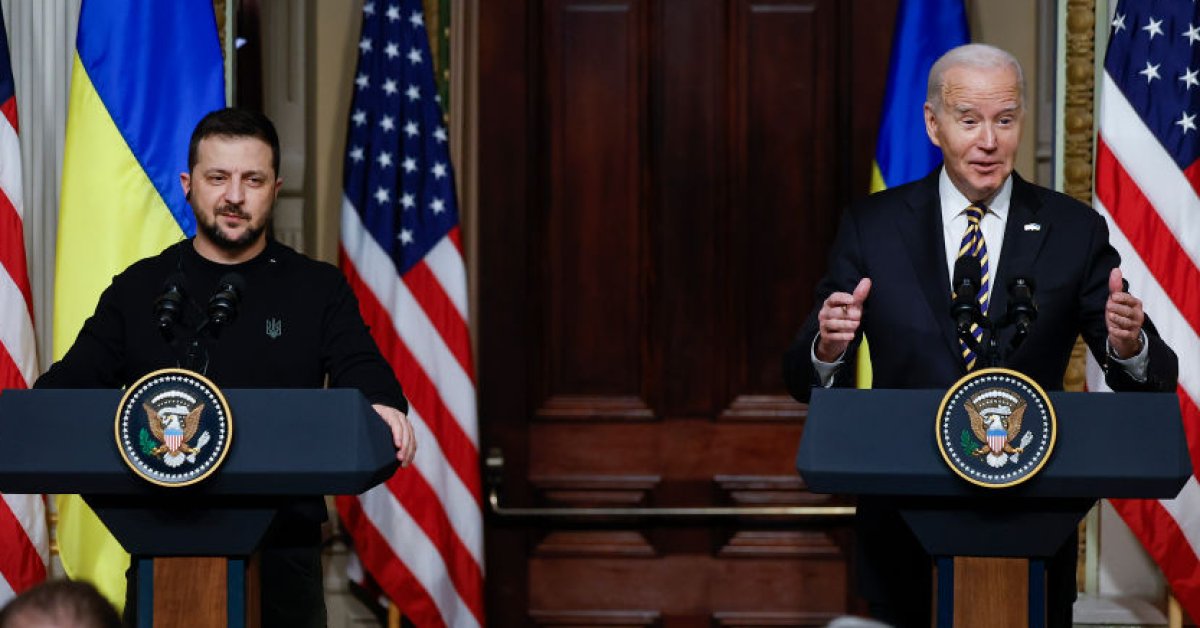
Why the U.S. Has the Most to Gain From Supporting Ukraine
Supporting Ukraine is not just an act of charity, it is in our self-interest, write Jeffrey Sonnenfeld and Steven Tian.
Why the U.S. Has the Most to Gain From Supporting Ukraine
February 14, 2024 1:55 PM EST
President Biden Meets With Visiting Ukrainian President Zelensky At The White House
Supporting Ukraine is not just an act of charity, it is in our self-interest, write Jeffrey Sonnenfeld and Steven Tian. Here, Ukraine President Zelensky and U.S. President Biden address press in Washington in Dec. 2023.Chip Somodevilla—Getty Images
Donald Trump’s invitation for Russia to invade NATO countries catalyzed anxiety that Europe may have to fight Russian aggression alone, as Trump and his followers are becoming increasingly assertive that supporting Ukraine is a bad deal for the U.S.
Earlier this week, Trump, who has long viewed foreign policy from the prism of money, highlighted the defense money he says is supplied by the U.S., comparing it to that paid by other countries. "You don't pay your bills, you get no protection. It's very simple," he said. “Hundreds of billions of dollars came into NATO, and that's why they have money.” Trump went on to call Ukrainian President Volodymyr Zelensky “the greatest salesman in history” and promised that he himself will “get the Ukraine war settled.”
On the heels of Tucker Carlson's fawning interview with President Vladimir Putin in Moscow, Elon Musk’s assertion that “we have to kill” Ukraine aid because “there’s no way in hell Putin is going to lose,” and flagging public support for Ukraine more broadly, Trump is pressuring his House GOP acolytes, led by Speaker Mike Johnson, to kill the $60 billion funding bill for Ukraine, despite its passage by the Senate, with Marjorie Taylor Greene arguing “Ukraine is not the 51st state.”
Having catalyzed 1,200 major global corporations to exit Russia two years ago in protest over the bloody invasion of a peaceful, sovereign nation, we are not surprised to have received scores of alarmed messages. We have been reviewing the economics behind continuing U.S. support to Ukraine, and even setting aside the terrible human suffering amidst thousands of civilian deaths; the fact that helping Ukraine defend itself is saving millions of lives and forestalling World War III given Putin's imperial ambitions; as well as the diplomatic and national security value of such aid, in actuality, the U.S. is the single biggest winner from supporting Ukraine. Here are three tangible reasons why.
90% of Ukraine aid spending stays in the U.S., creating thousands of jobs
Although some may claim U.S. aid vanishes into a cesspool of unchecked Ukrainian corruption, one study has shown that 90% of Ukraine aid dollars are not actually sent to Ukraine after all. Rather, these funds stay in the U.S., where leading defense contractors have invested tens of billions in over 100 new industrial manufacturing facilities, creating thousands of jobs across at least 38 states directly, with vital subcomponents sourced from all 50 states.
Virtually all the munitions Ukraine is most reliant upon are fully built in the U.S., ranging from javelins made in Alabama, to Guided Multiple Launch Rocket Systems (GMLRS) made in West Virginia, Arkansas, and Texas. Not forgetting the smaller-ticket items such as night-vision gear, medical supplies, and small-arms ammunition, all made in the U.S. Any additional Ukraine aid would likely only help the U.S. economy even more, since previous weapons shipments were largely drawdowns of musty old stockpiles and existing inventories rather than new supplies.
The Ukraine conflict has revitalized NATO, lessening the relative economic burden on the U.S.
Though Trump has complained for years that the European countries are not contributing their fair share to NATO—a common gripe of President Obama’s as well—and despite Trump’s threats to let “Russia do whatever the hell they want” to NATO free-riders, Trump largely failed in his quest to get the E.U. countries to contribute meaningfully more to their own defense, and ironically, only Putin has been able to succeed where Trump failed.
The degree to which Europe is now stepping up to the plate after Putin’s invasion of Ukraine and sharing the burden with the U.S. is striking. Prior to Putin’s invasion of Ukraine, only two European countries spent more than 2% of their GDP on defense spending. Now, 11 NATO members spend more than 2% of their GDP on defense, with some members such as Poland spending even more than the U.S. as a percentage of GDP. At least six European countries increased their defense spending by over 10% last year alone, including some by up to 30%.
Furthermore, although, under Trump, the U.S. spent over twice of what the rest of NATO spent on their own defense, combined; now, Europe’s financial commitments toward Ukraine exceed that of the U.S., with European aid especially invaluable over the last month as the U.S. funding spigot dried up, with some countries such as Estonia setting aside half their defense budget for Ukraine. This is not to mention the addition of new members paying their own way such as Finland, with Sweden soon to follow.
Russian military might has been severely degraded without a single active duty American military casualty
Although critics point out that both Ukraine and Russia are largely stalemated militarily, with neither side making any substantive territorial gains since fall 2022, the U.S. is the single biggest winner regardless, with one of the world’s three most potent militaries severely degraded and humiliated without a single active duty American military casualty, using only 5% of our U.S. defense budget and less than 1% of our total government spending—with a sum equivalent to the amount the U.S. is spending on such mundane items such as software for government agencies; COVID rental relief; and interstate highway traffic signs.
By contrast, Russia is now spending 40% of its government budget on defense, cannibalizing the rest of the productive economy to fund war after losing 50% of its military might over the last two years
 , not dissimilar to how Ronald Reagan’s famed “Star Wars” program disproportionately drove Soviet military spending to unsustainable levels. This trend will likely only continue as Russia continues to embarrass itself over its incompetent prosecution of the war. After all, over the last five months alone, Russia has lost at least a fifth of its prized naval fleet—the most powerful navy in the world by some measures prior to the war—even though its adversary, Ukraine, does not even have a navy, amidst continued heavy casualties numbering over 500,000 by some estimates.
, not dissimilar to how Ronald Reagan’s famed “Star Wars” program disproportionately drove Soviet military spending to unsustainable levels. This trend will likely only continue as Russia continues to embarrass itself over its incompetent prosecution of the war. After all, over the last five months alone, Russia has lost at least a fifth of its prized naval fleet—the most powerful navy in the world by some measures prior to the war—even though its adversary, Ukraine, does not even have a navy, amidst continued heavy casualties numbering over 500,000 by some estimates.Elsewhere we have shown that the Russian productive economy is imploding under the weight of economic sanctions and historic corporate withdrawals of 1,000+ companies as well as Putin’s cannibalization for the war effort. While Putin has concealed most of its required national income statistics to the International Monetary Fund (IMF), through triangulated research we previously found several Russian economic sectors have collapsed up to 90 percent, foreign direct investing into Russian has gone from $100 billion a year to zero, there has been a massive capital outflow matched by millions of top tech professional fleeing, over 2/3 of Russia’s exports are energy and energy profits have been sliced in half with a virtual inability to sell its gas to any country and oil sold at breakeven prices. Beyond cannibalizing the 70 percent of the Russian economy he now controls, Putin’s only hope for winning is that Trump will shatter the unity of allies which is strangling Russia’s aggression.
As the House considers the $60 billion in Ukraine aid approved by the Senate, Speaker Mike Johnson need not be imprisoned by his past, similar to how Richard Nixon used his anticommunist credibility to forge a working relationship with communist China. In facing a similar dilemma eighty years ago, former GOP Senator Arthur Vandenberg, a leading isolationist, pivoted 180 degrees and helped fortify wavering GOP support for the Marshall Plan among his colleagues after World War II. Vandenberg warned in a pivotal speech on the floor of the Senate in 1945,
”We must have maximum Allied cooperation and minimum Allied frictions. We have fabulously earned the right to be heard in respect to the basis of this unity. We need the earliest possible clarification of our relations with our brave allies.”
One does not even need to consider what the ripple effect of an appeasement-pleading surrender to Putin’s brutal imperial ambitions would mean for Central Europe, not to mention Taiwan, and the global economic crisis that would cause, to see why the U.S is the single biggest winner from supporting Ukraine, with substantial, immediate, and tangible benefits for not just American security but also even the U.S. economy.
We need to not succumb to Trump’s pathological career-long fear of partnership and collective action. As isolationist Vanderberg said, we must unify around “the most courageous thinking of which we are capable.” We confront such a moment now, but supporting Ukraine is not just an act of courage, or even charity. Supporting Ukraine is in our self-interest, and America is the single biggest winner from supporting Ukraine.
ADevilYouKhow
Rhyme Reason
SpaceX will try to stop Russia using Starlink internet, Ukraine says, after Musk denied it was happening at all
Elon Musk denied that Russia had any access to Starlink, which Ukraine aggressively disputed. On Monday Ukraine said a deal was underway to stop it.
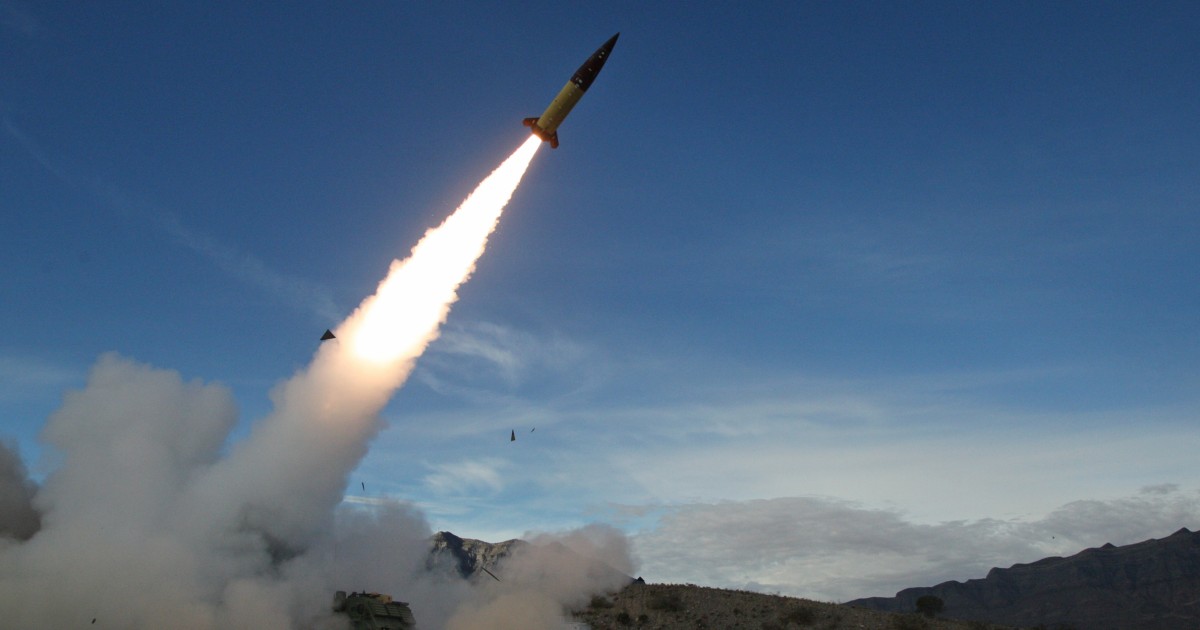
Biden administration is leaning toward supplying Ukraine with long-range missiles
If Republicans continue to block U.S. military aid to Ukraine, the White House could turn to an ally to provide Kyiv with ATACM missiles capable of striking Russian-held Crimea.

Sweden Mobilizes To Save Ukraine’s River Force: 10 New Armored Boats
While Russia-aligned Republicans in the U.S. Congress continue to block U.S. aid to Ukraine, European countries are scrambling to fill the gap.
 www.forbes.com
www.forbes.com
https://www.reuters.com/world/europe/sweden-donates-another-680-mln-military-aid-ukraine-2024-02-20/
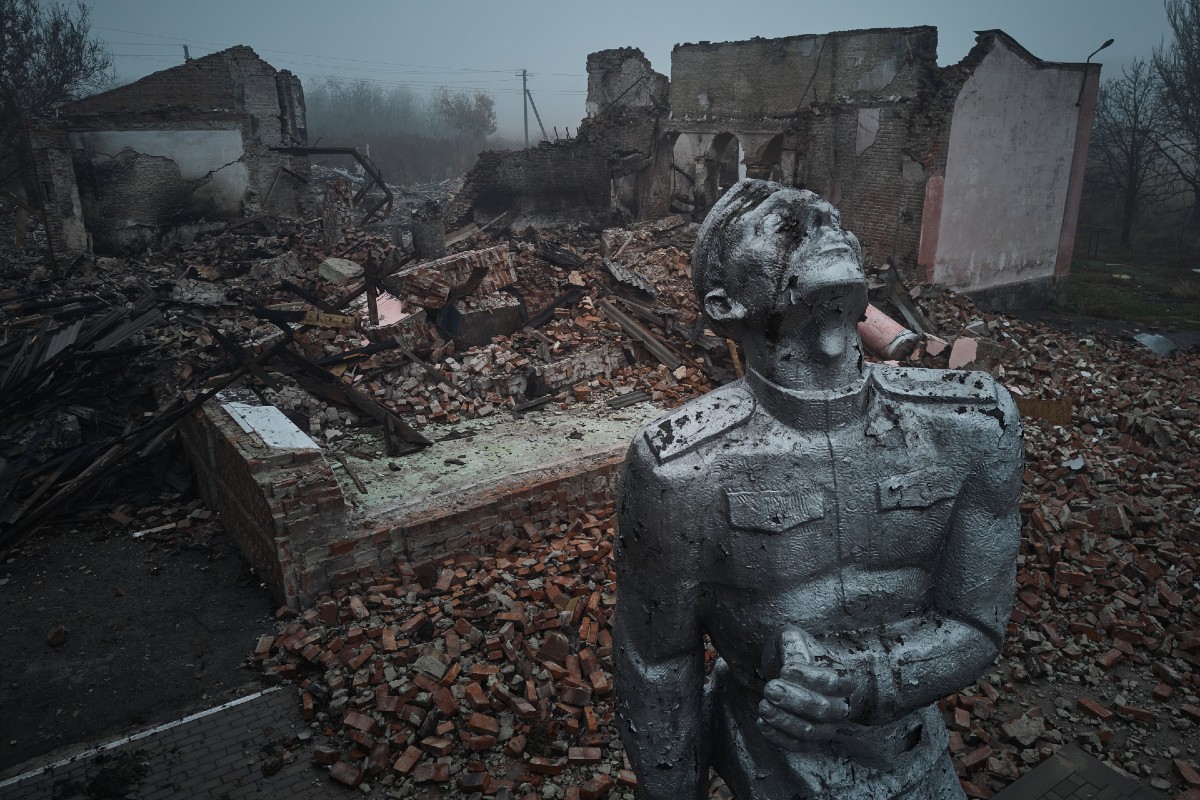
Russia's Avdiivka losses higher than entire Soviet-Afghan war
Russia sustained more than 47,000 casualties in the monthslong onslaught around the Donetsk city of Avdiivka, Ukraine's military has said.
Last edited:

Russia arrests US dual national over alleged $51 Ukrainian charity donation
Ksenia Khavana faces up to 20 years in prison for treason amid Kremlin crackdown
Russia arrests US dual national over alleged $51 Ukrainian charity donation
Ksenia Khavana faces up to 20 years in prison for treason amid Kremlin crackdown

Ksenia Khavana reportedly made a donation to Razom for Ukraine on 24 February 2022, the first day of the war against Ukraine. Photograph: Twitter
Andrew Roth
Wed 21 Feb 2024 06.40 EST
The White House has said it is seeking information after Russia announced it had arrested a dual US-Russian citizen on treason charges, accusing her of collecting funds for Ukrainian organisations and openly opposing the Russian war in Ukraine.
A Russian legal NGO, First Dept, said the woman, named by the media in Russia as Ksenia Khavana, may stand accused of transferring $51 (£40) to a Ukrainian charity on 24 February 2022, the day Vladimir Putin launched his invasion of Ukraine. She faces up to 20 years in prison.
Russia’s FSB security agency reported on Tuesday that it had detained a 33-year-old woman from Los Angeles who holds dual citizenship. Reports said she had attended the Ural Federal University in Ekaterinburg and later married an American citizen and moved to the US.
Photographs from social media showed Khavana smiling, flanked by two US flags, as she holds her naturalisation documents.

View image in fullscreen
Ksenia Khavana posing with her US naturalisation papers. Photograph: Twitter
Asked about the case, the US national security spokesperson John Kirby reiterated warnings about US citizens travelling to Russia.
Meanwhile, there were a series of reports on Tuesday of a Russian crackdown on perceived threats from abroad. Russia’s state financial monitoring agency added the US senator Lindsey Graham to a database of terrorists and extremists, probably for his criticism of the war in Ukraine.
A Russian court also sentenced a former adviser to the Russian embassy in France to 18 years in prison on state treason charges, while Russia declared the US Congress-funded Radio Free Europe an “undesirable organisation”, essentially banning the broadcaster’s activities in the country.
Khavana’s arrest in January occurred shortly before Putin confirmed there were backroom talks with the US to negotiate a prisoner exchange, including the jailed Wall Street Journal reporter Evan Gershkovich. Dual citizens are less often considered in such trades.
The FSB saidon Tuesday: “Since February 2022, [Khavana] has been proactively collecting funds in the interests of one of the Ukrainian organisations, which were subsequently used to purchase tactical medicine items, equipment, weapons and ammunition by the armed forces of Ukraine. In addition, on the territory of the United States, this citizen has repeatedly participated in public actions in support of the Kyiv regime.”
First Dept said the NGO had information that Khavana had been charged for transferring $51.80 to the Ukrainian charitable fund Razom for Ukraine, which helps fund medical equipment for first responders and other humanitarian causes.
The transfer was made on 24 February 2022, according to First Dept, the day Russia launched its full-scale war against Ukraine.
Dora Chomiak, the chief executive of Razom for Ukraine, said: “Razom is appalled by reports that a US-Russian dual national has been arrested by Russian authorities for purportedly making a charitable donation to Razom for Ukraine in the immediate aftermath of Russia’s full-scale invasion of Ukraine.
“Razom calls on the US government to continue to do everything in its power to demand that President Putin release all those unjustly detained by Russia and to hold Russia’s political and military leadership accountable for their unprovoked invasion of Ukraine.”
Noting that the charity was US-founded and US-based, Chomiak said Razom was “committed to supporting a prosperous, secure and democratic future for Ukraine” and had received donations from hundreds of thousands of people.
“Our activities, which are in keeping with our charitable purpose and our legal obligations as an American charitable organisation, are focused on humanitarian aid, disaster relief, education and advocacy,” she said.
Russia is already holding several US citizens in prison, including Gershkovich, who was arrested last March on espionage charges while on a reporting trip in Ekaterinburg.
Gershkovich, who has been held in Moscow’s Lefortovo prison for nearly a year, appeared in court on Tuesday, where a judge extended his pretrial custody for another two months.
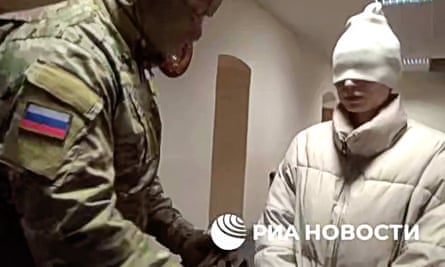
Ksenia Khavana is escorted to a Russian court. Photograph: Twitter
Paul Whelan, a former marine who was arrested in 2018 on espionage charges in Moscow is also still in prison, where he says he has felt “abandoned” by the US; and Alsu Kurmasheva, a Russian-American journalist was detained in her native Tatarstan in October on charges of failing to register as a foreign agent, as well as publishing “fake news” about the Russian military.
Both Russia and the US have said there are backroom talks about a potential prisoner exchange, but do not appear to have struck a deal yet. Putin compared Gershkovich to Vadim Krasikov, an FSB hitman jailedby a German court for the assassination of Chechen field commander Zelimkhan Khangoshvili in Berlin, when asked about the case by the former Fox News host Tucker Carlson in an interview. After the interview, the Russian president mocked Carlson for a “lack of sharp questions”.
ADevilYouKhow
Rhyme Reason
Pro-war Russian blogger who revealed huge Avdiivka losses dies by suicide — Guardian US
Andrey Morozov said he had been pressured to delete post detailing number of casualties
This is the stupid shyt I’m talking about
Mr.bocario
Superstar
Coward.Deleted